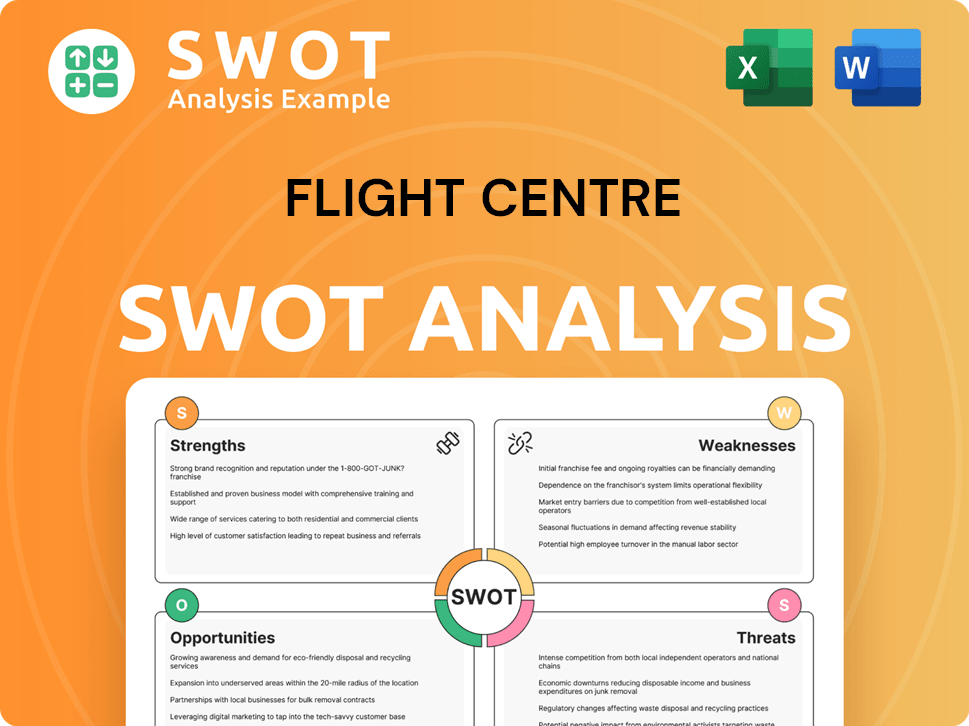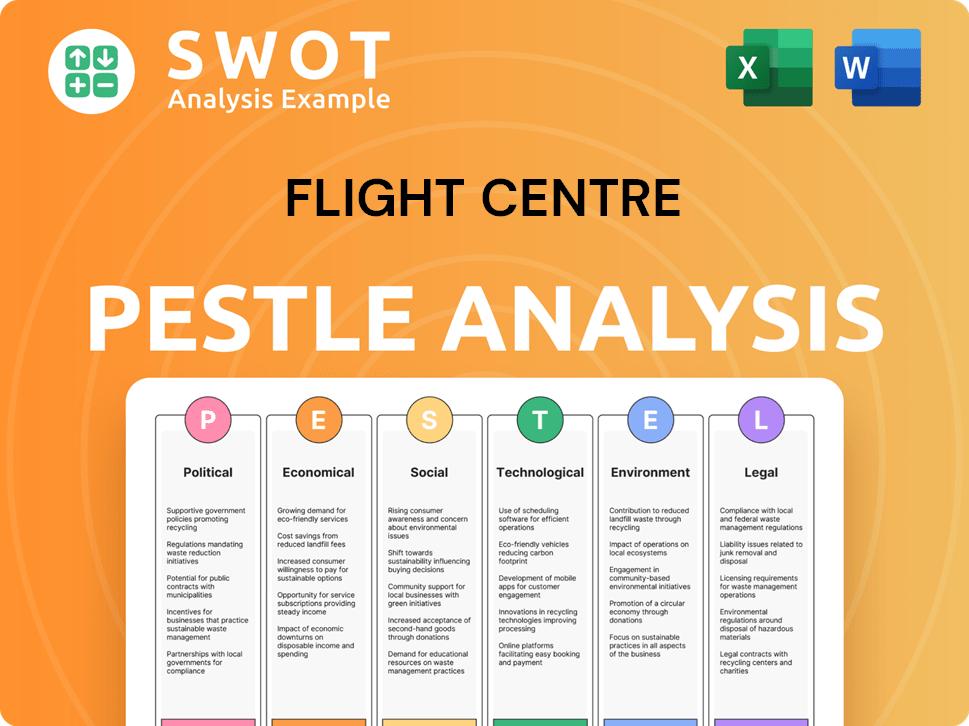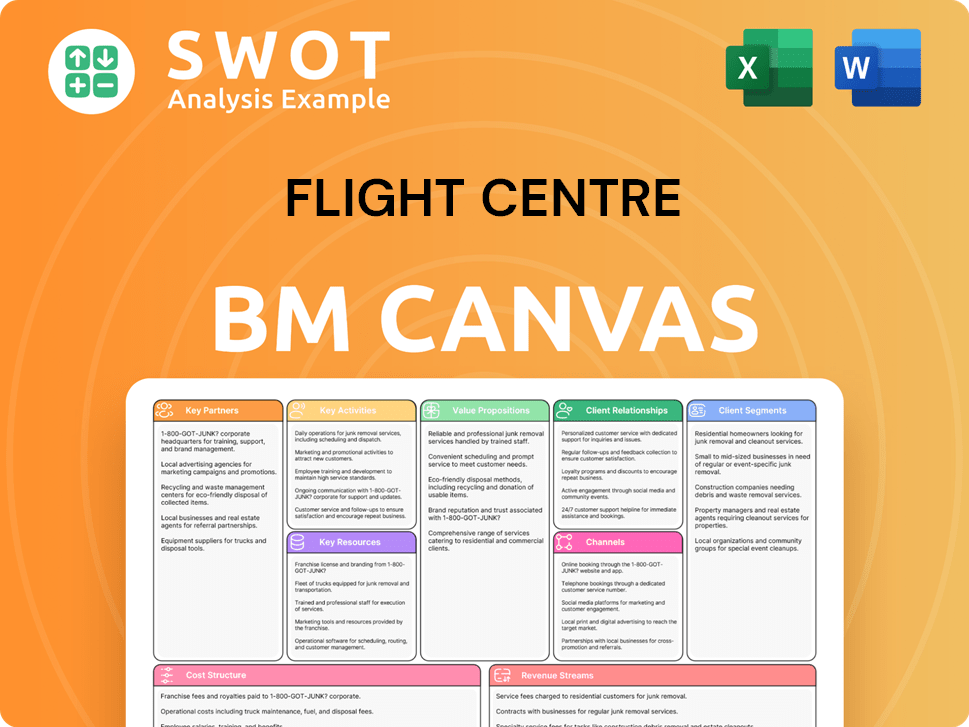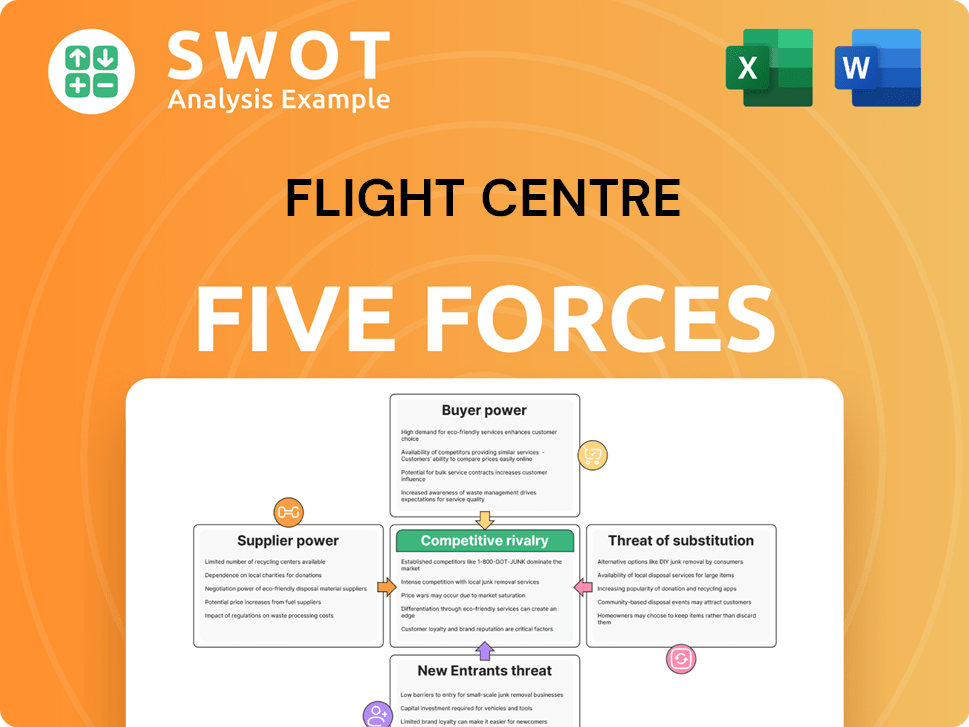Flight Centre Bundle
How Did Flight Centre Become a Global Travel Giant?
Journey back to 1973, when Flight Centre's story began with a double-decker bus and a dream. From humble beginnings in Australia, this Flight Centre SWOT Analysis reveals how a small tour operator transformed into a leading force in the travel industry. Discover the key moments and strategic decisions that shaped this remarkable Flight Centre company.

This Flight Centre history showcases an incredible evolution, from its roots as an Australian company to its current status as one of the world's top travel agencies. Explore the Flight Centre company origins, its expansion timeline, and how it has navigated the ever-changing travel industry. Learn about the founders, key milestones, and strategies that have solidified Flight Centre's global presence and business model.
What is the Flight Centre Founding Story?
The story of Flight Centre, a prominent travel agency, began in 1973 with a double-decker bus named 'Argas'. Founders Graham 'Skroo' Turner and Geoff 'Spy' Lomas, initially focused on overland bus tours, setting the stage for what would become a global travel empire. This early venture laid the groundwork for the company's future in the travel industry.
The company's evolution from bus tours to a major player in the airline industry is a testament to its founders' adaptability and foresight. The shift towards discounted airfares in the early 1980s marked a pivotal moment, leading to the establishment of the first Flight Centre store. This strategic move capitalized on the deregulation of the airline industry, setting the stage for significant growth.
The Flight Centre history is marked by a series of strategic decisions and expansions. The company's initial focus on providing discounted airfares quickly gained traction, leading to rapid growth and expansion. By the end of 1982, just months after the first store opened, Flight Centre had expanded to nine shops, employing around 50 people. This early success highlighted the effectiveness of their business model and their ability to meet the evolving needs of travelers.
Here are some key milestones in the early days of the Flight Centre company:
- 1973: Graham 'Skroo' Turner and Geoff 'Spy' Lomas purchase a double-decker bus, 'Argas,' and start Argas Persicus Travel, focusing on overland tours.
- 1974: Bill James joins as a partner.
- 1975: The company is renamed Topdeck Travel.
- October 1975: Topdeck launches its first double-decker bus tour from London to Kathmandu.
- March 29, 1982: The first Flight Centre store opens in Sydney.
- By the end of 1982: Flight Centre expands to nine shops with approximately 50 employees.
- 1986: Turner, James, and Harris merge their travel agencies to formally establish Flight Centre Aust Pty Ltd.
Flight Centre SWOT Analysis
- Complete SWOT Breakdown
- Fully Customizable
- Editable in Excel & Word
- Professional Formatting
- Investor-Ready Format

What Drove the Early Growth of Flight Centre?
The early years of the Flight Centre company were marked by swift expansion and strategic moves into new markets. From its beginnings in Australia, the Flight Centre quickly set its sights on international growth. This aggressive approach helped establish the Flight Centre history as a significant player in the global travel industry.
In 1984, the Flight Centre opened its first international office in London, achieving a profit of £60,000 with just six staff in its first year. This initial success demonstrated the viability of the Flight Centre's business model beyond Australia. This early success set the stage for further international expansion.
The company continued its international expansion in the mid-1990s, opening its first retail store in Johannesburg, South Africa, on December 17, 1994, and breaking even within three months. This was followed by the opening of Flight Centre UK and Flight Centre Canada in 1995. These strategic moves increased the Flight Centre's global presence.
In 1993, Flight Centre Corporate was established in Melbourne, later rebranded as Corporate Traveller in 1996, marking the company's entry into the corporate travel sector. By 1995, Flight Centre was listed on the Australian Securities Exchange (ASX). The company's growth efforts were shaped by its ability to adapt to market conditions. For more details, see Marketing Strategy of Flight Centre.
As of the first half of the 2025 fiscal year, Flight Centre's corporate business delivered a 2% increase in Total Transaction Value (TTV) and a 4% increase in underlying profit before tax (UPBT) to AU$96 million. This showcases continued solid performance and growth for the Flight Centre company.
Flight Centre PESTLE Analysis
- Covers All 6 PESTLE Categories
- No Research Needed – Save Hours of Work
- Built by Experts, Trusted by Consultants
- Instant Download, Ready to Use
- 100% Editable, Fully Customizable

What are the key Milestones in Flight Centre history?
The Flight Centre has achieved numerous milestones throughout its history, solidifying its position as a leading player in the travel industry. From its early days as an Australian company to its current global presence, the Flight Centre company has consistently adapted and innovated to meet the evolving needs of travelers.
| Year | Milestone |
|---|---|
| 1980 | The company was founded, marking the beginning of its journey in the travel agency sector. |
| 1988 | Introduction of the 'Lowest Airfares Guaranteed' slogan, significantly boosting inquiries. |
| 1996 | Held its first Flight Centre Airfare and Holiday Expo in Brisbane, attracting over 8,000 customers. |
| 2020 | The company implemented an emergency equity raising of AU$700 million to navigate the challenges posed by the COVID-19 pandemic. |
| 2021 | Acquired Shep and made an equity investment in TPConnects, enhancing its technological capabilities. |
| 2025 | Achieved an AU$117 million underlying profit before tax for the first half of the 2025 fiscal year. |
The Flight Centre has consistently embraced innovation to stay ahead in the competitive travel industry. A key example is the early adoption of the 'Lowest Airfares Guaranteed' strategy, which revolutionized its marketing approach. The company's investment in technology, including platforms like Melon and its acquisition of Shep, further demonstrates its commitment to providing cutting-edge services.
The introduction of the slogan in 1988 was a pivotal marketing strategy. This initiative led to a substantial increase in customer inquiries.
The company pioneered travel expos, holding its first event in 1996. This event attracted a large number of customers, showcasing its innovative approach to customer engagement.
Flight Centre has invested in technology, launching new platforms such as Melon for Corporate Traveller. The acquisition of Shep and investment in TPConnects further enhanced its technological capabilities.
The corporate business continues to trade solidly in most regions. Productivity gains of 15% to 20% are expected between fiscal years 2024 and 2026.
During the COVID-19 pandemic, the company issued over AU$1 billion in customer refunds. This demonstrated its commitment to customer service during challenging times.
In April 2020, Flight Centre undertook an emergency equity raising of AU$700 million. This was a strategic move to strengthen its financial position amidst the pandemic.
Throughout its history, the Flight Centre has faced numerous challenges that have tested its resilience. Global events such as the Gulf War, 9/11, the Global Financial Crisis (GFC), and the Iraq War significantly impacted the travel industry. More recently, the COVID-19 pandemic caused a severe decline in the company's share price and led to the temporary suspension of trading.
The Gulf War in 1991 led to a decline in international airfare demand. Flight Centre strategically pivoted to selling domestic flights to mitigate the impact.
The early 2000s brought further disruption with 9/11, the collapse of Ansett, the Global Financial Crisis (GFC), and the Iraq War. Despite these market downturns, Flight Centre maintained a strategy of continued growth and market entry.
The COVID-19 pandemic severely impacted the travel industry, causing Flight Centre's share price to decline by 80%. The company temporarily stood down over 15,000 employees globally.
During the COVID-19 pandemic, Flight Centre's share price declined significantly. This was a direct result of the travel restrictions and reduced demand.
Over 15,000 employees globally were temporarily stood down during the COVID-19 pandemic. This was a necessary measure to manage costs during the crisis.
Flight Centre has consistently faced market downturns, including those caused by global events and economic crises. The company has shown resilience by adapting its strategies.
Flight Centre Business Model Canvas
- Complete 9-Block Business Model Canvas
- Effortlessly Communicate Your Business Strategy
- Investor-Ready BMC Format
- 100% Editable and Customizable
- Clear and Structured Layout

What is the Timeline of Key Events for Flight Centre?
The journey of the Flight Centre company, a significant Australian company in the travel industry, is marked by strategic growth and adaptation. From its humble beginnings as an overland tour operator, the company has expanded into a global travel agency with a rich history. Key milestones include its founding in 1973, the opening of its first store in 1982, international expansions, and its listing on the Australian Securities Exchange (ASX) in 1995. The company has navigated challenges like the COVID-19 pandemic, while also making strategic acquisitions to strengthen its market position. For a deeper look at how the company has grown, check out the Growth Strategy of Flight Centre.
| Year | Key Event |
|---|---|
| 1973 | Founders Graham Turner and Geoff Lomas purchased a double-decker bus, beginning overland tours under Argas Persicus Travel, later Topdeck Travel. |
| 1982 | First Flight Centre store opens in Sydney, Australia. |
| 1984 | Flight Centre expands internationally, opening an office in London. |
| 1987 | Operations begin in New Zealand. |
| 1988 | 'Lowest Airfares Guaranteed' slogan introduced. |
| 1993 | Flight Centre Corporate (later Corporate Traveller) is established. |
| 1994 | Flight Centre opens in Johannesburg, South Africa. |
| 1995 | Flight Centre UK and Flight Centre Canada open; company lists on the Australian Securities Exchange (ASX). |
| 1996 | First Flight Centre Airfare and Holiday Expo held. |
| 2004 | FCM Travel Solutions brand officially launched. |
| 2007 | Flight Centre Travel Money (now Travel Money) foreign exchange business launched. |
| 2008 | Acquisition of GOGO Worldwide Vacations. |
| 2015 | Acquires StudentUniverse and a 70% stake in BYOjet. |
| 2020 | Significant impact from COVID-19, leading to temporary closures and staff reductions. |
| 2023 | Acquires Scott Dunn. |
| 2024 (October) | Acquires Cruise Club UK to boost market share in the cruise sector. |
| 2025 (February) | Reports AU$117 million underlying profit before tax for the first half of FY25. |
Flight Centre is focused on increasing its distribution and supply networks. This expansion includes an omni-channel approach to reach more customers. The company is also working to strengthen its low-cost models.
The company is investing heavily in digital transformation, especially through its Global Procurement Network division, the Copernicus Program. This program aims to improve speed to market and reduce costs. AI is expected to bring 15-20% productivity gains between FY24 and FY26.
The corporate business is expected to continue its strong performance. A robust pipeline of new account wins is projected to generate over AU$1 billion in annual spends during fiscal year 2025 for FCM Travel. The 'Grow to Win' model emphasizes productive operations.
Flight Centre plans to invest approximately AU$25 million in TPConnects in 2025. The long-term vision is to become the world's largest and most successful corporate travel company by 2035. This includes operations in over 50 countries and a global workforce of 80,000 employees.
Flight Centre Porter's Five Forces Analysis
- Covers All 5 Competitive Forces in Detail
- Structured for Consultants, Students, and Founders
- 100% Editable in Microsoft Word & Excel
- Instant Digital Download – Use Immediately
- Compatible with Mac & PC – Fully Unlocked

Related Blogs
- What is Competitive Landscape of Flight Centre Company?
- What is Growth Strategy and Future Prospects of Flight Centre Company?
- How Does Flight Centre Company Work?
- What is Sales and Marketing Strategy of Flight Centre Company?
- What is Brief History of Flight Centre Company?
- Who Owns Flight Centre Company?
- What is Customer Demographics and Target Market of Flight Centre Company?
Disclaimer
All information, articles, and product details provided on this website are for general informational and educational purposes only. We do not claim any ownership over, nor do we intend to infringe upon, any trademarks, copyrights, logos, brand names, or other intellectual property mentioned or depicted on this site. Such intellectual property remains the property of its respective owners, and any references here are made solely for identification or informational purposes, without implying any affiliation, endorsement, or partnership.
We make no representations or warranties, express or implied, regarding the accuracy, completeness, or suitability of any content or products presented. Nothing on this website should be construed as legal, tax, investment, financial, medical, or other professional advice. In addition, no part of this site—including articles or product references—constitutes a solicitation, recommendation, endorsement, advertisement, or offer to buy or sell any securities, franchises, or other financial instruments, particularly in jurisdictions where such activity would be unlawful.
All content is of a general nature and may not address the specific circumstances of any individual or entity. It is not a substitute for professional advice or services. Any actions you take based on the information provided here are strictly at your own risk. You accept full responsibility for any decisions or outcomes arising from your use of this website and agree to release us from any liability in connection with your use of, or reliance upon, the content or products found herein.